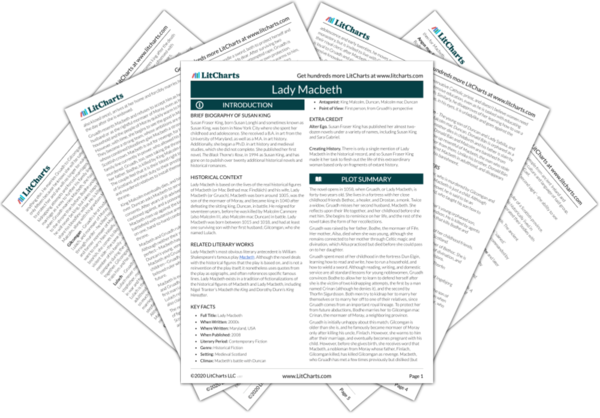History, Memory, and Storytelling
Lady Macbeth is a novel concerned with how storytelling and personal memory can affect greater historical narratives. Basing the story on real events, historical accounts, and religious archives surrounding one of history’s most infamous queens, author Susan Fraser King has done her best to reconstruct Lady Macbeth’s life, imbuing her with motivations, emotions, and depth that have been erased by the passage of time. This interest in the narrative of history exists within the world…
read analysis of History, Memory, and StorytellingGender Roles
Gruadh (Lady Macbeth) lives in a world strictly segregated by gender. Women in the eleventh-century Scotland of the novel are expected to be quiet and domestic, to either be wives and mothers or to pursue some female-dominated occupation like midwifery. Their lives are dedicated to running a household and to producing and raising babies. Everything outside of the walls of the home, meanwhile, is the domain of men. Gruadh, too, is burdened by expectations that…
read analysis of Gender RolesMagic, Tradition, and Religion
In Lady Macbeth Scotland is torn between Celtic tradition and the rise of Christianity. Although the Church eventually wins out, for years the two practices coexist, and Gruadh and others, although ostensibly Christian, also rely upon pagan magic—including divination, incantations, and prayer—to heal and protect themselves and to plan for the future. Each tradition serves its own purpose, the novel suggests, and the blending of Catholicism and paganism makes Scotland and its people powerful, flexible…
read analysis of Magic, Tradition, and Religion
Fate, Family, and Ambition
In Lady Macbeth, a person’s family history determines their future. For Gruadh and Macbeth especially, their quest for power is motivated by the deep-seated belief that they deserve to be king and queen of Scotland because of their heritage. Their personal ambition is framed as the conclusion to a multigenerational journey in which they will unite their ancient, respected lineages and come together as the rightful monarchs of Scotland. Gruadh relates this ascent as nationally…
read analysis of Fate, Family, and AmbitionViolence, Justice, and Revenge
Gruadh and Macbeth, the married couple at the center of Lady Macbeth, are motivated by revenge. Both have had family members killed and titles taken from them. Because of this, they decide to dedicate their lives to avenging their families, reclaiming their titles, and punishing the men who took so much from them. Sometimes revenge calls for violence, but occasionally it requires patience and political scheming. Although Macbeth enters the novel fully versed…
read analysis of Violence, Justice, and Revenge






